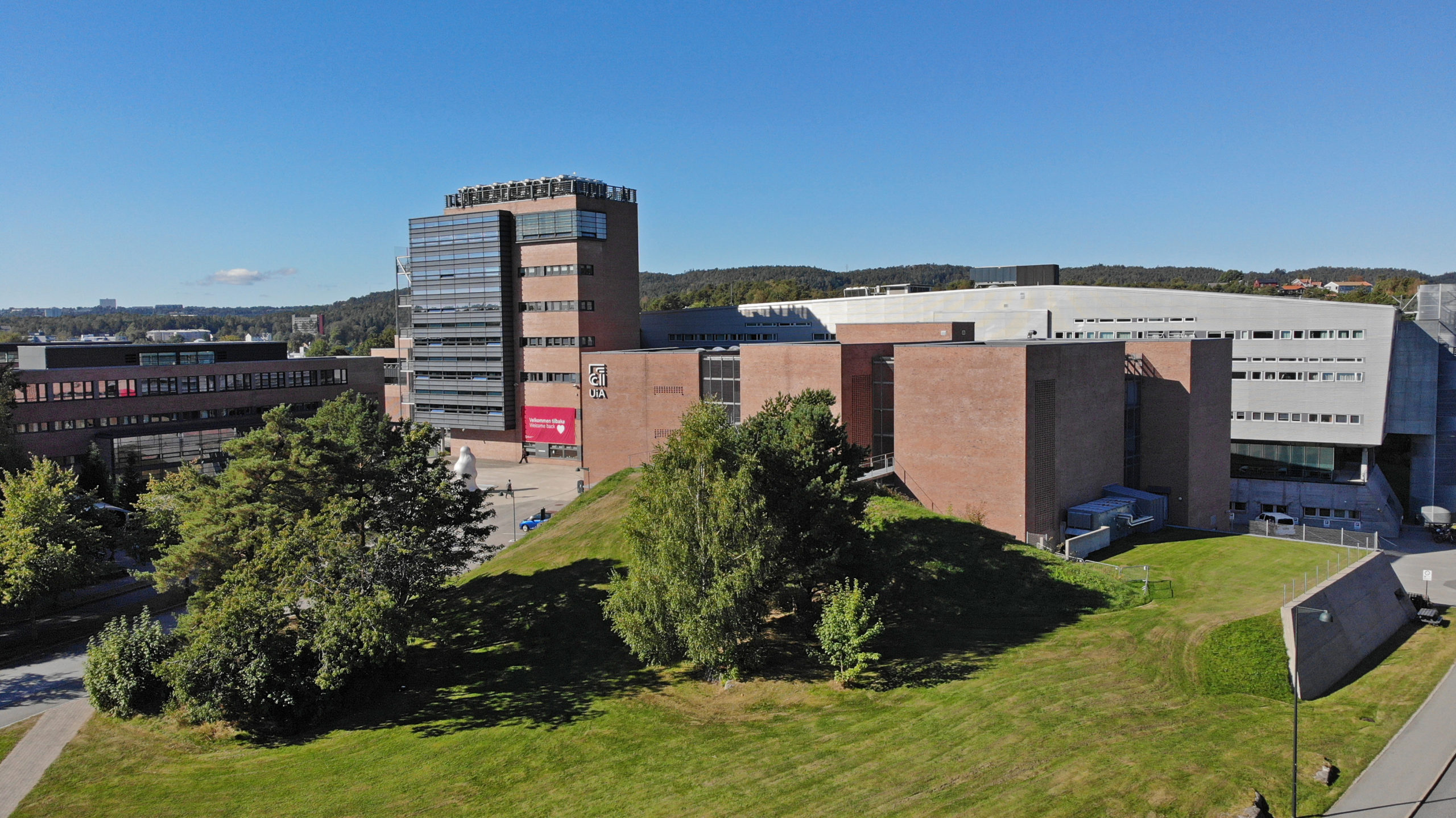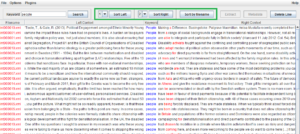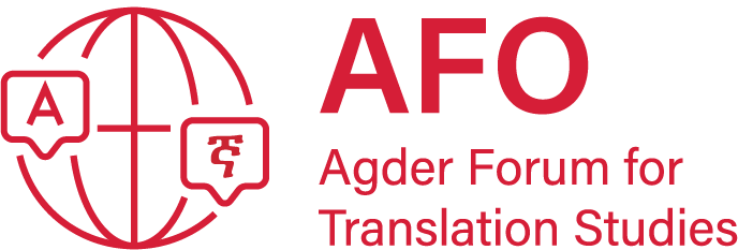
Corpus-based Translation Studies

Electronic corpora are large collections of texts that researchers use to gain a better understanding of how language is actually used – as opposed to how it is meant or expected to be used.
Translation scholars draw on corpora to study various features of translated language, i.e., the traces that the translation activity leaves when new language versions of existing texts are produced. Corpora also help researchers to identify idiosyncratic patterns in the way words or expressions are used, or the resonances that certain linguistic items evoke.
Within AFO, we use corpora to:
- gain a better understanding of how knowledge translation (i.e., the operationalisation of knowledge or expertise into policy or regulations) is linguistically realised
- support analyses of the impact that language mediators have on the way institutional interaction unfolds
- to investigate the characteristics of translated language as a specific language variety
Selected Publications
- Dura, E., and B. Gawronska (2008) ‘Natural Language Processing in Information Fusion Terminology Management’, Proceedings of the 11th International Conference on Information Fusion. Köln: ISIF IEEE.
- Dura, E. and B. Gawronska (2009) ‘Novelty Extraction from Special and Parallel Corpora’. Lecture Notes in Computer Science, Volume 5603/2009, Berlin/Heidelberg: Springer, 291-302.
- Gawronska, B., O. Nikolayenkova, and B. Erlendsson (2006) ‘A Corpus-based Analysis of English, Swedish, Polish, and Russian Prepositions’, in A. Botinis (ed.) Proceedings of ISCA Workshop on Experimental Linguistics, 137-140.
- Halverson, S. L. (2017) ‘Developing a Cognitive Semantic Model: Magnetism, Gravitational Pull, and Questions of Data and Method”, in G. de Sutter, M.-A. Lefer and I. Delaere (eds) Empirical Translation Studies. New Methods and Theoretical Traditions, Berlin: Mouton de Gruyter, 9-45.
- Hansen-Schirra, S., J. Nitzke and S. Gutermuth (2021) ‘An Intralingual Parallel Corpus of Translations into German Easy Language (Geasy Corpus): What Sentence Alignments Can Tell Us About Translation Strategies in Intralingual Translation’, in V. X. Wang, L. Lim and D. Li (eds) New Perspectives on Corpus Translation Studies, Singapore: Springer, 281-298.
- Pérez-González, L. (2020) ‘‘Is Climate Science Taking Over the Science?’: A Corpus-based Study of Competing Stances on Bias, Dogma and Expertise in the Blogosphere’, Humanities and Social Sciences Communications 7 (92). Open Access | doi.org/10.1057/s41599-020-00582-z
- Pérez-González, L. (2006) ‘Interpreting Strategic Recontextualization Cues in the Courtroom’, Journal of Pragmatics 38: 390-417.
Literary Translation

Literary texts are manifestations of advanced, creative language use, and translating them requires complex decisions on the part of the translator. What distinguishes literature from informative texts is its aesthetic function: the form of a literary text contributes to its meaning. Moreover, literature appeals to emotions and plays a vital role in forming worldviews, aesthetic standards, and moral attitudes.
Questions that a translator of literature faces and that are addressed by AFO researchers include, among other:
- should the lexical, purely linguistic sense have preference over the original’s rhythm and stylistic figures?
- should literary texts written several centuries ago be translated using an archaic style, or should the language be adapted to the contemporary use?
- how should a translator handle references to the source language culture that may be unknown for the target language reader?
Selected Publications
- Gawronska, B. (2025) ‘A Romantic Novella’s Afterlife: Four Translations of Der Goldene Topf by E.T.A. Hoffmann’, Translation Review 121: 53-65, DOI: 10.1080/07374836.2025.2460948
- Gawronska, B. (2022): ‘The World of George Grosz’s Pictures and the World Depicted in the Novel Pokora by Szczepan Twardoch’. To appear in Polylogue. Neophilological Studies.
- Gawronska, B. (2019) ‘Cultural References and Linguistic Exponents of Gender in Michal Witkowski’s Lubiewo’, Languages, Cultures, Worldviews: Focus on Translation. Palgrave Macmillan, chapter 15, 367-392.
- Gawronska, B. (2019) ‘Romantyzm, realizm i dylematy tłumacza w świecie fantastyki i grozy [Romanticism, Realism and Translators’ Dilemmas in the Word of Phantasy and Horror]’, Polylogue. Neophilological Studies 9: 159-180. doi:https://doi.org/10.34858/polilog.9.2019.302.
- Gawronska, B. (2013) ‘Nordiska medeltidsballader i informationsteknologins tidsålder’, Acta Sueco-Polonica. ISSN: 1104-3431.
- Gawronska, B. (2011) ‘Gender in Language and Gender in Culture. On Translation of the Novel Lubiewo by Michal Witkowski into German and Swedish’, Folia Scandinavica Posnaniensia 12: 57-70.
Theme image by lil_foot_ at Pixabay
Multimodality and Media Translation

In translation studies, multimodality is used to investigate the contribution that non-verbal semiotics make to meaning-making practices in various genres and texts, and to gauge how the distribution of meaning across various types of signifying resources influences translation behaviour and the reception of translated texts.
Although they have not been so far theorised primarily from a multimodal theoretic stance, audiovisual and media translation are among the sites of multimodal mediation to have attracted more attention from translation scholars to date.
At AFO, multimodality is at the centre of qualitative research on:
- the modelling of composite semiotic systems, such as colour, music and movement, and their combination with written and spoken language in translated multimodal texts the modelling of composite semiotic systems, such as colour, music and movement, and their combination with written and spoken language in translated multimodal texts
- the contribution that digital technologies, conceptualised as semiotic software, make to the production and consumption of translated digital media content
- the grammaticisation of translators’ reliance on multimodal resources
- the study of traditional modalities of audiovisual translation, including subtitling and dubbing, and accessible practices
- the emergence of new participatory forms of audiovisual translation and multimodal literacy to advance fandom subcultures and activist movements in digital culture
Selected Publications
- Gawronska, B. (2023) ‘The Magic of Sound and Colour. Multimodality in Eleanor Farjeon’s Martin Pippin Books and their Translations into Polish’, Polylogue. Neophilological Studies 13: 167-182, DOI: 10.34858/polilog.13.2023.402
- Nitzke, J., S. Hansen-Schirra, A. K. Habig and S. Gutermuth (2022) ‘Translating Subtitles into Easy Language: First Considerations and Empirical Investigations’, in M. P. Castillo Bernal and M. Estévez Grossi (eds.) Translation, Mediation and Accessibility for Linguistic Minorities, Berlin: Frank & Timme, 127-143.
- Pérez-González, L. (2020) ‘Audiovisual Translation’, in M. Baker and G. Saldanha (eds) The Routledge Encyclopedia of Translation Studies, 3rd edition, London and New York: Routledge, 30-34.
- Pérez-González, L. (2020) ‘Fan Audiovisual Translation’, in M. Baker and G. Saldanha (eds) The Routledge Encyclopedia of Translation Studies, 3rd edition, London and New York: Routledge, 172-177.
- Pérez-González, L. (2020) ‘Multimodality’, in M. Baker and G. Saldanha (eds) Routledge Encyclopedia of Translation Studies, 3rd edition, London and New York: Routledge, 346-351.
- Pérez-González, L. (2019) ‘From the ‘Cinema of Attractions’ to Danmu: A Multimodal-Theory Analysis of Changing Subtitling Aesthetics across Media Cultures’, in M. Boria, A. Carreres, M. Noriega-Sánchez and M. Tomalin (eds) Beyond Words: Multimodal Encounters in Translation, London & New York: Routledge, 94-116.
- Pérez-González, L. (2017) ‘Investigating Digitally Born Subtitling Agencies in the Context of Popular Culture’, in D. Orrego Carmona and Y. Lee (eds) Non-Professional Subtitling, Newcastle: Cambridge Scholars, 15-36.
- Pérez-González, L. (2016) ‘The Politics of Affect in Activist Amateur Subtitling: A Biopolitical Perspective’, in M. Baker and B. Blaagaard (eds) Citizen Media and Public Spaces: Diverse Expressions of Citizenship and Dissent, London and New York: Routledge, 118-135.
- Pérez-González, L. (2014) Audiovisual Translation: Theories, Methods and Issues, London & New York: Routledge.
- Pérez-González, L. (2014) ‘Multimodality in Translation Studies: Theoretical and Methodological Perspectives’, in S. Bermann and C. Porter (eds) A Companion to Translation Studies, Chichester: Willey-Blackwell, 119-131.
- Pérez-González, L. (2014) ‘Translation and New(s) Media: Participatory Subtitling Practices in Networked Mediascapes’, in J. House (ed.) Translation: A Multidisciplinary Approach, Advances in Linguistics Series, Palgrave Macmillan, 200-221.
- Pérez-González, L. (2013) ‘Amateur Subtitling as Immaterial Labour in Digital Media Culture: An Emerging Paradigm of Civic Engagement’, Convergence: The International Journal of Research into New Media Technologies 19(2): 157-175.
- Pérez-González, L. (2013) ‘Co-creational Subtitling in the Digital Media: Transformative and Authorial Practices’, International Journal of Cultural Studies 16(1): 3-21.
- Pérez-González, L. (2012) ‘Amateur Subtitling and the Pragmatics of Spectatorial Subjectivity’, Language and Intercultural Communication 12(4): 335-353.
- Pérez-González, L. (2009) ‘Audiovisual Translation’, in M. Baker and G. Saldanha (eds) The Routledge Encyclopedia of Translation Studies, second edition, London and New York: Routledge, 13-20.
- Pérez-González, L. (2007) ‘Intervention in New Amateur Subtitling Cultures: A Multimodal Account’, Linguistica Antverpiensia 6: 67-80.
- Pérez-González, L. (2007) ‘Appraising Dubbed Conversation. Systemic Functional Insights into the Construal of Naturalness in Translated Film Dialogue’, The Translator: Studies in Intercultural Communication 13(1): 1-38.
Theme image by Jan Alexander at Pixabay
Sociocognitive Translation Studies

Numerous social and human sciences are currently positing the integration of the social and cognitive domains in attempts to better understand a range of complex human activities. Examples include work within the fields of cognitive anthropology, cognitive sociology, and cognitive sociolinguistics. Recent work in Translation Studies also recognizes the need to wed these two domains; this is particularly visible in work that builds on embodied cognition or ‘usage-based’ theories of language.
Some strands of Cognitive Translation Studies research are more directly concerned with the cognitive processes that underpin translation and interpreting activity. Here the focus is on the translator’s or interpreter’s linguistic choices or language production behavior and the ways in which these are impacted by various aspects of general cognition or by translators’ or interpreters’ use of translation technology, among other things. Empirical research in this strand makes use of methods such as corpus analysis, eye-tracking or keylogging, and may also include interviews or retrospection.
Within AFO, our work under this theme explores:
- the development of a usage-based theory of translation. This work is related to activities within the INTERACT network (https://interact.ugent.be/) but is also represented in independent publications
- the impact of the cognitive organization of linguistic knowledge on translational behaviour
- the impact of new technologies on cognitive translation processes
- the cognitive development of translation ability
- the reception of translated texts
Selected publications
- Bangalore, S., B. Behrens, M. Carl, Michael, M. Ghankot, A. Heilmann, J. Nitzke, M. Schaeffer and A. Sturm (2016) ‘Syntactic Variance and Priming Effects in Translation’, in M. Carl, S. Bangalore and M. Schaeffer (eds) New Directions in Empirical Translation Process Research, Springer: Cham, 211-238.
- Halverson, S. L. and H. Kotze (2022) ‘Sociocognitive Constructs in Translation and Interpreting Studies: Do We Really Need Concepts Like Norms and Risk when we Have a Comprehensive Usage-based Theory of Language?’, in S. L. Halverson and Á. Marín Garcia (eds) Contesting Epistemologies in Cognitive Translation Studies, New York: Routledge, 51-79.
- Halverson, S. L. (2021) ‘Translation, Linguistic Commitment and Cognition’, in F. Alves and A. L. Jakobsen (eds) The Routledge Handbook of Translation and Cognition, Abingdon & New York: Routledge, 37-51.
- Halverson, S.L. (2019) ‘‘Default’ translation’: A Construct for Cognitive Translation and Interpreting Studies’, Translation, Cognition and Behavior 2(2): 187-210.
- Hansen-Schirra, S. and J. Nitzke (2021) ‘Translation, the Process–product Interface and Cognition’, in F. Alves and A. L. Jakobsen (eds) The Routledge Handbook of Translation and Cognition, Abingdon & New York: Routledge, 415-432.
- Hemeren, P. and B. Gawronska (2007) ‘Lexicalization of Natural Actions and Cross-linguistic Stability’, in Ahlsén et al. (eds) Communication – Action – Meaning. A Festschrift to Jens Allwood, Göteborg: Göteborg University, 57-74.
- Muñoz Martín, R. and S. L. Halverson (eds.) (2021) Multilingual Mediated Communication and Cognition. London: Routledge.
- Nitzke, J. (2019) Problem Solving Activities in Post-editing and Translation from Scratch: A multi-method study, Berlin: Language Science Press.
Theme image by Gerd Altmann at Pixabay
Translation and Sociology

The sociology of translation explores the role of translators as social agents; the impact of field conventions, narratives or norms on translation practices and the reception of translations; and the involvement of institutions, companies and communities on the production and dissemination of translated knowledge and information.
Sociological approaches to translation deploy a range of research methods, including but not limited to archival work, ethnographic (and netnographic) observation, surveys and interviews.
Within AFO, sociological work addresses the following issues:
- ideology in Bible translation and the construction of religious identity
- (re)translations of the Bible and their reception
- the intervention of the Norwegian state in the field of literary translation
- literary translators’ perceptions on their own role and activity
- conceptualisation of translation in academic and professional discourses
- networked and participatory agencies of media translation in digital culture
Selected publications:
- Beckmann, M. (2025) “Ideology, power, and a virgin: Translations of Isaiah 7:14 in Norwegian Bible translations as a case study.” Target. International Journal of Translation Studies 37(3): 414–443.
- Beckmann, M. (2020) ‘Negotiating Christology. The Translation of Colossians 1:15 as a Case Study’, in Bylund et. al. (eds) Nordic Interpretations of the New Testament, Göttingen: Vandenhoeck & Ruprecht, 75–102.
- Beckmann, M. (2019) Jesus i oversettelse, Oslo: Cappelen Damm Akademisk.
- Beckmann, M. (2018) “Bibel 2011 – nærmere grunnteksten? Guds evige sønn i Romerne 1,4” Teologisk Tidsskrift 123(2): 120–144.
- Beckmann, M. (2015) “Noter til gjenfødelse – Dåpsteologien i parateksten til Bibelselskapets oversettelser 1959–2011”, Teologisk Tidsskrift 4(4): 391–414.
- Beckmann, M. (2013) and Å. Justnes (2013) “Når tekst og teologi konkurrerer. Kolosserne 1,15, Kolosserne 1,18 og Åpenbaringen 3,14 i Bibelselskapets oversettelser”, in Justnes et al. (eds) Ny bibel, nye perspektiver. Grunntekster, oversettelse og teologi, Kristiansand: Portal forlag.
- Halverson, S. L. (2008) ‘Translations as Institutional Facts. An Ontology for ‘Assumed Translation’”, in A. Pym, M. Shlesinger and D. Simeoni (eds) Beyond Descriptive Translation Studies. In Homage to Gideon Toury, Amsterdam: John Benjamins, 343-361.
- Pérez-González, L. (2022) ‘Subtitling Disinformation Narratives around COVID-19. ‘Foreign’ Vlogging in the Construction of Digital Nationalism in Chinese Social Media’, Unsettling Translation, in M. Baker (ed.) London and New York: Routledge, 232-247.
- Pérez-González, L. (2016) ‘The Politics of Affect in Activist Amateur Subtitling: A Biopolitical Perspective’, in M. Baker and B. Blaagaard (eds) Citizen Media and Public Spaces: Diverse Expressions of Citizenship and Dissent, London and New York: Routledge, 118-135.
- Pérez-González, L. (2012) (with S. Susam-Saraeva) ‘Non-professionals Translating and Interpreting: Theoretical and Methodological Perspectives’, The Translator 18(2). Special Issue on ‘Non‐professionals Translating and Interpreting: Participatory and Engaged Perspectives’: 149-165.
- Pérez-González, L. (ed.) (2012) Translation, Interpreting and the Genealogy of Conflict, Special Issue of The Journal of Language and Politics 11(2).
- Pérez-González, L. (2010) ‘‘Ad-hocracies’ of Translation Activism in the Blogosphere: A Genealogical Case Study’, in M. Baker, M. Olohan and M. Calzada (eds) Text and Context: Essays on Translation and Interpreting in Honour of Ian Mason, Manchester: St. Jerome, 259-287.
- Wichne, E. (forthcoming) Det norske gjendiktingsbegrepet, 1872-2012. En oversettelsessosiologisk undersøkelse. Upublisert doktoravhandling. Fakultet for humaniora og pedagogikk, Universitetet i Agder.
- Wichne, E. (unpublished, 2022) Det norske gjendiktingsbegrepet, 1872-2012. En oversettelsessosiologisk undersøkelse. Doktoravhandling. Fakultet for humaniora og pedagogikk. Universitetet i Agder.
Theme image by Gerd Altmann at Pixabay
Translation Technologies

Translation technologies have become ubiquitous in the translation industry. In addition to shaping translation workflows, they are meant to enhance translators’ productivity and consistency. Translation technologies is a broad term designating a wide range of translation aids, including simple word processing tools and online dictionaries, but also sophisticated translation memory environments or terminology management systems. Translation technologies also include more specialised tools, such as subtitling tools or software localisation software, quality assurance tools and, in more recent years, machine translation systems.
Within AFO, our research on translation technologies examines:
- the use of machine translation for post-editing purposes
- the implications of the ubiquity of translation technologies for the translation industry and translators’ working conditions
- the cognitive impact of translation tools on translational behaviour and decision-making
Selected Publications
- Gawronska, B. (2007) ‘Computational Linguistics in Sweden’, Acta Sueco Polonica 14: 29-40.
- Way, A. and B. Gawronska (eds) (2007) TMI 2007. Proceedings of the 11th International Conference on Theoretical and Methodological Issues in Machine Translation. Skövde University Studies in Informatics 2007: 1, ISSN 1653-2325, ISBN 978-91-977095-0-7.
- Dura, E. and B. Gawronska (2005) ‘Towards Automatic Translation of Support Verbs Constructions: The Case of Polish ‘robić/zrobić’ and Swedish ‘göra”, in Z. Vetulani (ed.) Human Language Technologies as a Challenge for Computer Science and Linguistics, Poznan, 450-454.
- Hansen-Schirra, S., J. Nitzke, S. Gutermuth, C. Maaß and I. Rink (2020). ‘Technologies for Translation of Specialised Texts into Easy Language’, in S. Hansen-Schirra and C. Maaß (eds) Easy Language Research: Text and user perspectives, Berlin: Frank & Timme, 99-127.
- Nitzke, J. (2025) ‘Teaching translation technologies for languages of low diffusion’, trans-kom 18.1 (2025): 70-82.
- Nitzke, J. and S. Hansen-Schirra (2021) A Short Guide to Post-editing, Berlin: Language Science Press.
- Nitzke, J. and A. K. Gros (2020) ‘Preferential Changes in Revision and Post-editing in Translation Revision and Post-editing’, in M. Koponen, B. Mossop, I. S. Robert and G. Scocchera (eds) Translation Revision and Post-Editing, London: Routledge, 21-34.
- Nitzke, J., S. Hansen-Schirra and C. Canfora (2019) ‘Risk Management and Post-editing Competence’, The Journal of Specialised Translation 31, 239-259.
Theme image by Joshua Woroniecki at Pixabay
